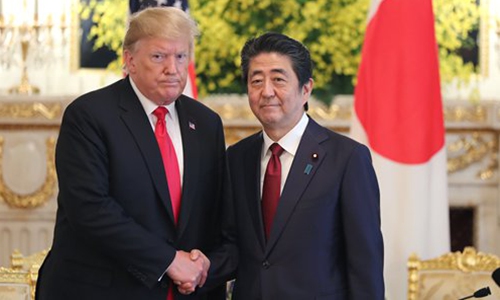HOME >> OPINION
Japan’s ‘indestructible’ US security treaty outdated and under threat
By Li Ruoyu Source:Global Times Published: 2020/2/4 19:53:42

Photo: IC
"Today, more than ever, the Japan-US security treaty is a pillar that is indestructible, a pillar immovable, safeguarding peace in Asia, the Indo-Pacific, and in the world, while assuring prosperity therein," said Japanese Prime Minister Shinzo Abe on January 19, offering high praise of the Treaty of Mutual Cooperation and Security between the United States and Japan when the two countries marked the 60th anniversary of the pact.
Compared to the Security Treaty Between the United States and Japan in 1951, the 1960 treaty gave Japan more rights and obligations and shaped the framework of Japan-US ties, which is of great significance to Japan.
Abe's family background is often considered a reason for his special fondness of the existing security treaty. In 1960, then Japanese prime minister Nobusuke Kishi signed the treaty, when Dwight Eisenhower was in office. As Kishi's grandson, Abe has seemingly taken maintaining the Japan-US military alliance as a family mission. This can also be seen in the Abe administration's policies.
The 1960 security pact recognizes the "right of collective self-defense," stating that "Each Party recognizes that an armed attack against either Party in the territories under the administration of Japan would be dangerous to its own peace and safety and declares that it would act to meet the common danger in accordance with its constitutional provisions and processes." This right has been regarded as essential to the Japan-US military alliance.
However, provisions in Japan's Constitution, which stipulates "the Japanese people forever renounce war," underlie a growing controversy. Six decades after the treaty was signed, the treaty has not provided a practical opportunity for Japan to step out of its post-war constitutional limits to self defense.
Abe changed this situation. On July 1, 2014, the Abe administration approved a constitutional interpretation which allows Japan to become involved in the defense of its allies, thus relaxing limits on the country's engagement in collective self-defense. Boosting Japan's role in its US alliance was an important reason Abe advocated a Constitution amendment. It is an excuse Japan has used to strengthen its military far beyond what its Constitution allows.
At an event for the 60th anniversary of the treaty, Abe pledged to bolster Tokyo's role under the security treaty to include "outer space and cyberspace." This may also explain why Abe values the pact with the US so highly.
It is worth noting that the signing of the security treaty in 1960 stirred up a huge wave of opposition in Japan, and eventually led to the resignation of Kishi. Even now the treaty is controversial due to the inequality in the status of the two countries. Various incidents linked to the security treaty have aroused strong resentment among the Japanese people, such as the relocation of US military bases in Japan.
As a product of the last century, the treaty is behind the times. For example, the 1978 Guidelines for Japan-US Defense Cooperation, which was derived from the security treaty, set specific countries as imaginary enemies. After the collapse of the Soviet Union, Northeast Asia became a new focus for Japan-US military cooperation.
While peace and development are the mainstream for today's world, military alliances, based on a cold war mind-set that target third parties, are clearly out of touch with the times.
More importantly, although Abe still follows his grandfather's political philosophy, the incumbent US President Donald Trump is no heir of Eisenhower. In the 1950s and 1960s, the US offered Japan substantial economic support to confront the Soviet Union. To some extent, the Japan-US security treaty came with unspoken economic concessions from the US. But economic concessions are the last thing Trump seems willing to consider.
Although Trump spoke highly of US-Japan military cooperation, he has asked Japan to pay more for US troops stationed in Japan. While there may still be room in negotiations on paying more, it is unclear if Trump sees the security treaty, which Abe has guarded with all his heart, is still ideal.
The author is an associate professor at the School of History & Cultures, Sichuan University. opinion@globaltimes.com.cn
RELATED ARTICLES:
Posted in: VIEWPOINT,ASIAN REVIEW